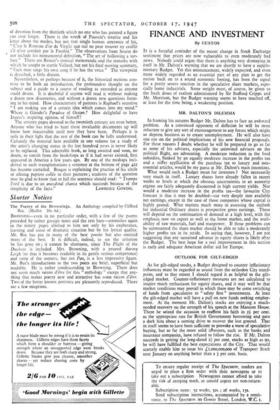FINANCE AND INVESTMENT
By CUSTOS
IT is a forceful reminder of the recent change in Stock Exchange sentiment that prices are now vulnerable to even moderately bad news. Nobody could argue that there is anything very dismaying in itself in Mr. Dalton's warning that we are shortly to have a supple- mentary Budget. Yet this announcement, widely expected, and even more widely regarded as an essential part of any plan to get the nation back on to a sound economic footing, has been the signal for a pretty severe reaction in the speculative share markets, espe- cially home industrials. Some weight must, of course, be given to the fresh doses of realism administered by Sir Stafford Cripps and Mr. Morrison, but the Budget warning seems to have touched off, at least for the time being, a weakening position.
MR. DALTON'S DILEMMA
In framing his autumn Budget Mr. Dalton has to face an awkward problem. As a convinced opponent of deflation he will be most reluctant to give any sort of encouragement to any forces which might so depress business as to create unemployment. He will also have one eye on the political implications of his new financial proposals. For these reasons I doubt whether he will be prepared to go as far as some of his advisers, especially the uninvited advisers on the political Right, are advocating. A moderate reduction in the food subsidies, flanked by an equally moderate increase in the profits tax and a stiffer application of the purchase tax to luxury and non- essential articles, would be my guess at Mr. Dalton's main intentions.
What would such a Budget mean for investors ? Not necessarily very much in itself. Luxury shares have already fallen in recent weeks to levels at which the obvious uncertainties in an austerity regime are fairly adequately discounted in high current yields. Nor would a moderate increase in the profits tax—the favourite City forecast is that it may be doubled—cut very deeply into available net earnings, except in the case of those companies whose capital is highly geared. What matters much more in assessing the outlook for industrial Ordinary shares is prospective gross earnings. These will depend on the continuation of demand at a high level, with the emphasis now on export as well as the home market, and the avail- ability of raw materials, fuel and manpower. If these problems can be surmounted the share market should be able to take a moderately higher profits tax in its stride. In saying that, however, I am not suggesting that any sustained advance in equity shares is likely after the Budget. The best hope for a real improvement in this section is early and adequate American dollar aid for Europe.
OUTLOOK FOR GILT-EDGED As for gilt-edged stocks, a Budget designed to counter inflationary influences must be regarded as sound from the orthodox City stand- point, and to that extent I should regard it as helpful to the gilt- edged market. Counter-inflationary measures are not calculated to inspire much enthusiasm for equity shares, and it may well be that market conditions may prevail in which there may be some switching of funds from speculative to "safety first" investments. At least the gilt-edged market will have a pull on new funds seeking employ- ment. At the moment Mr. Dalton's stocks are enjoying a much- needed recovery on the strength of his speech at the Mansion House. There he seized the occasion to reaffirm his faith in 21 per cent. as the appropriate rate for British Government borrowing and gave a dark hint about a coming drive to recover the lost ground. That in itself seems to have been sufficient to provoke a wave of speculative buying, but so far the more solid hi'vestors, such as the banks and insurance companies, have refused to follow the rise. If Mr. Dalton succeeds in getting the long-dated 2+ per cent, stocks as high as 90, he will have fulfilled the best expectations of the City. That would scarcely enable him to issue his £I,000,000,000 of Transport Stock next January on anything better than a 3 per cent. basis.


































 Previous page
Previous page